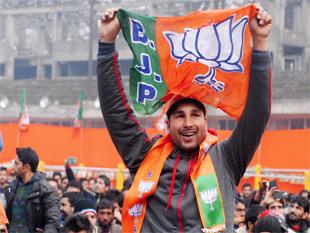 Srinagar, Dec 23: BJP was leading in 16 seats while PDP was ahead in 15 in the early trends of counting of votes in Jammu and Kashmir where Chief Minister Omar Abdullah was ahead by a slender margin in Beerwah constituency but trailing by over 1,800 votes in Sonawar seat.
Srinagar, Dec 23: BJP was leading in 16 seats while PDP was ahead in 15 in the early trends of counting of votes in Jammu and Kashmir where Chief Minister Omar Abdullah was ahead by a slender margin in Beerwah constituency but trailing by over 1,800 votes in Sonawar seat.
BJP was ahead in 16, mostly in the Jammu region, of the 62 seats in the 87-member Assembly for which trends were available while PDP was close behind.
Congress was leading in 12 seats while National Conference is ahead of its rivals in 11 seats.
Omar was ahead by 243 votes in Beerwah over his nearest rival but trailing by 1,858 votes in Sonawar assembly seat.
PDP chief ministerial candidate Mufti Mohammad Sayeed was leading from Anantnag seat by 1,177 votes over Congress candidate Hilal Ahmad Shah.
Separatist turned mainstream politician Sajjad Gani Lone was doing well in Handwara seat while independents were ahead in four seats.
Deputy Chief Minister and Congress candidate from Chhamb Tara Chand was trailing Krishan Lal of BJP by a margin of 4,797 votes.
Senior Congress leader Nawang Rigzin Jora was leading over his BJP rival Chhering Dorje by 200 votes in Leh while NC's Tsetan Namgyal was ahead by 230 votes over his nearest rival in Nubra in Ladakh.
Another Congress candidate Manohar Lal Sharma was behind BJP candidate Nirmal Singh by a margin of 1,254 votes in Billawar constituency.
Surinder Choudhary of PDP was leading over BJP candidate Ravinder Raina by a margin of 2,377 votes in Nowshera constituency.
Chander Prakash Ganga of BJP was ahead of over former Minister and NC candidate S S Slathia from Vijaypur constituency by a margin of 1989 votes.
Devinder Kumar Manyal of BJP was leading over former minister and JKNPP candidate Yashpal Kundal by a margin of 3,369 votes in Samba constituency.
JKNPP candidate Balwant Singh Mankotia is leading over Independent candidate Pawan Gupta by a margin of 259 votes in Udhampur constituency.
Counting for the five-phase keenly fought election which saw a record turnout began at 8 AM. P






Comments
Add new comment